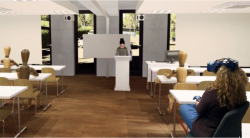Poster: Hoarseness among university professors and how it can influence students’ listening impression: an audio-visual immersive VR study

For university students, following a lecture can be challenging when room acoustic conditions are poor or when their professor suffers from a voice disorder. Related to the high vocal demands of teaching, university professors develop voice disorders quite frequently. The key symptom is hoarseness. The aim of this study is to investigate the effect of hoarseness on university students’ subjective listening effort and listening impression using audio-visual immersive virtual reality (VR) including a real-time room simulation of a typical seminar room. Equipped with a head-mounted display, participants are immersed in the virtual seminar room, with typical binaural background sounds, where they perform a listening task. This task involves comprehending and recalling information from text, read aloud by a female virtual professor positioned in front of the seminar room. Texts are presented in two experimental blocks, one of them read aloud in a normal (modal) voice, the other one in a hoarse voice. After each block, participants fill out a questionnaire to evaluate their perceived listening effort and overall listening impression under the respective voice quality, as well as the human-likeliness of and preferences towards the virtual professor. Results are presented and discussed regarding voice quality design for virtual tutors and potential impli-cations for students’ motivation and performance in academic learning spaces.
@InProceedings{Schiller2023Audictive,
author = {Isabel S. Schiller, Lukas Aspöck, Carolin Breuer,
Jonathan Ehret and Andrea Bönsch},
booktitle = {Proceedings of the 1st AUDICTIVE Conference},
title = {Hoarseness among university professors and how it can
influence students’ listening impression: an audio-visual immersive VR
study},
year = {2023},
pages = {134-137},
doi = { 10.18154/RWTH-2023-08885},
}

